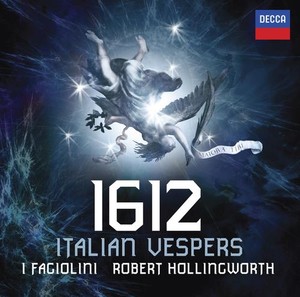The title, 1612 Italian Vespers, is a little misleading, the year
being chosen because it marks the death of Giovanni Gabrieli, the departure of
Monteverdi from Mantua and his move to Venice, and a notable composition of the
little known Parmesan composer, Lodovico Grossi da Viadana — the ambitious
4-part Vesper Psalms — rather than because of the provenance of any
one substantial work. Moreover, the most ambitious work recorded is itself
highly speculative: Giovanni Gabrieli’s 28-voice Magnificat is,
according to the press release, reconstructed by Hugh Keyte and I Fagiolini’s
founder and director Robert Hollingworth from 8 extant parts with
“scholarship fired by imagination”. Similarly, the hymn Ave, Maria
Stella, unites the double-choir setting from Monteverdi’s 1610
Vespers with Francesco Soriano’s collection of canons and oblighi,
published in the same year. Yet, since Monteverdi’s revered Vespers
have long inspired debate about the authenticity of the cohesiveness of the
constituent parts (were they ever performed as a whole, or were the
Vespers a publishing project designed to win Monteverdi a new job in
Venice?), perhaps such inventive conjecture does not matter, especially when
the resultant recording as sumptuous and full of vitality as this one.
Gabrieli’s lost masterpiece recreates a thanksgiving Vespers, The
Feast of the Holy Rosary, reputedly celebrated for 200 years in commemoration
of the famous Venetian victory over the Turks at Lepanto in 1574. The diverse
performers — vocal and instrumental — ‘choirs’ signifying ensemble
groupings rather than denoting vocalists or instrumentalists — rejoice in the
immense sound-scape and the intricate complexity of the idiom: dialogues,
echoes and extravagant rhetorical gestures, such as the vigorous repetitions of
the fittingly jubilant ‘He have shown strength in his arm/ scattered the
proud’, are fore-grounded, and their declamatory effects celebrated.
Monumental blocks of sound, conjuring the awesome, inspiring nature of the
original setting and context of performance contrast with sparser instrumental
textures. And, after a momentous pause — which Keyte presumes originally
offered an opportunity for a “‘military’ interpolation”, and for which
he duly supplies a fanfare and brief reminiscence of Andrea Gabrieli’s
Aria della battaglia for eight wind instruments — bells and cannon
fire surprise and excite, resurrecting the triumphant, self-congratulatory
festivities of years long hence and empires long lost.
The elder Gabrieli, Andrea, also features, in the form of the densely
textured, two-choir, Benedictus Dominus Deus Sabaoth, an assemblage of
war-like scriptural texts, presumed to be assembled for Lepanto celebrations,
which interposes rhythmically enlivened passages within the weighty sonorities
of the massed forces. Andrea Gabrieli’s Toccata del 9 Tono is a
brief but impressive study in finger technique, here ornamented impressively by
organist James Johnstone.
Despite the monumental scale of Gabrieli’s Magnificat it is
Claudio Monteverdi’s Ab aeterno ordinata sum, a supremely virtuosic
solo motet, which inspires most admiration, show-casing the range and
flexibility of bass, Jonathan Sells, as it moves from imperious dignity to
increasingly florid rhetorical splendour.
Of the less renowned composers represented, Viadana’s expressive text
setting impresses in a sequence of poly-choral psalms characterised by
expressive text setting, dramatic declamation and melodic richness — and
framed by beautifully pure, resonant antiphons, reflecting various aspects of
the Rosary feast, performed by the members of De Profundis. Massive sonorities
contrast with solo passages of inventive virtuosic expression, as two vocal
choirs are supplemented by additional high and low choirs for instruments,
creating a kaleidoscopic of colours and a rich, invigorating ambience.
Viadana’s O dulcissima Maria, for solo soprano is performed with
exquisite, piercing sweetness and dexterous agility by soprano Clare Wilkinson,
accompanied by theorbo and chamber organ.
Exaudi, Deus by Barbarino from the composer’s second book of solo
motets, allows an instrumentalist to shine, show-casing a wonderfully reedy,
resounding and elaborate cornetto solo by Gawain Glenton. The earlier
generation of composers is represented by Palestrina’s Quae ets ista
from the composer’s setting of the Song of Songs.
The disc concludes with an extra-liturgical motet: Giovanni Gabrieli’s
In ecclesiis which rejoices that ‘God [is] our helper for ever’.
Conjecture and assumption are necessary aspects of music-making among devotees
and scholars of Renaissance repertoire and Hugh Keyte introduces an additional
element of romance, commenting that when ‘resurrecting’ the original choirs
presumed to have been omitted from the later printed edition, the “recovery
process has often felt semi-automatic; as though the rejected parts were
phantoms jostling at my elbow, eager to be resuscitated”.
Standards of musicianship and technical accomplishment are extraordinarily
and consistently high. The diversity of textures, colours and combinations
ensures freshness and animation; the monumental balanced by the intimate. And,
the crisp definition of recording allows full appreciation of both massive
sonorities and subtle dialogues between contrasting groups and individual
voices.
Claire Seymour
